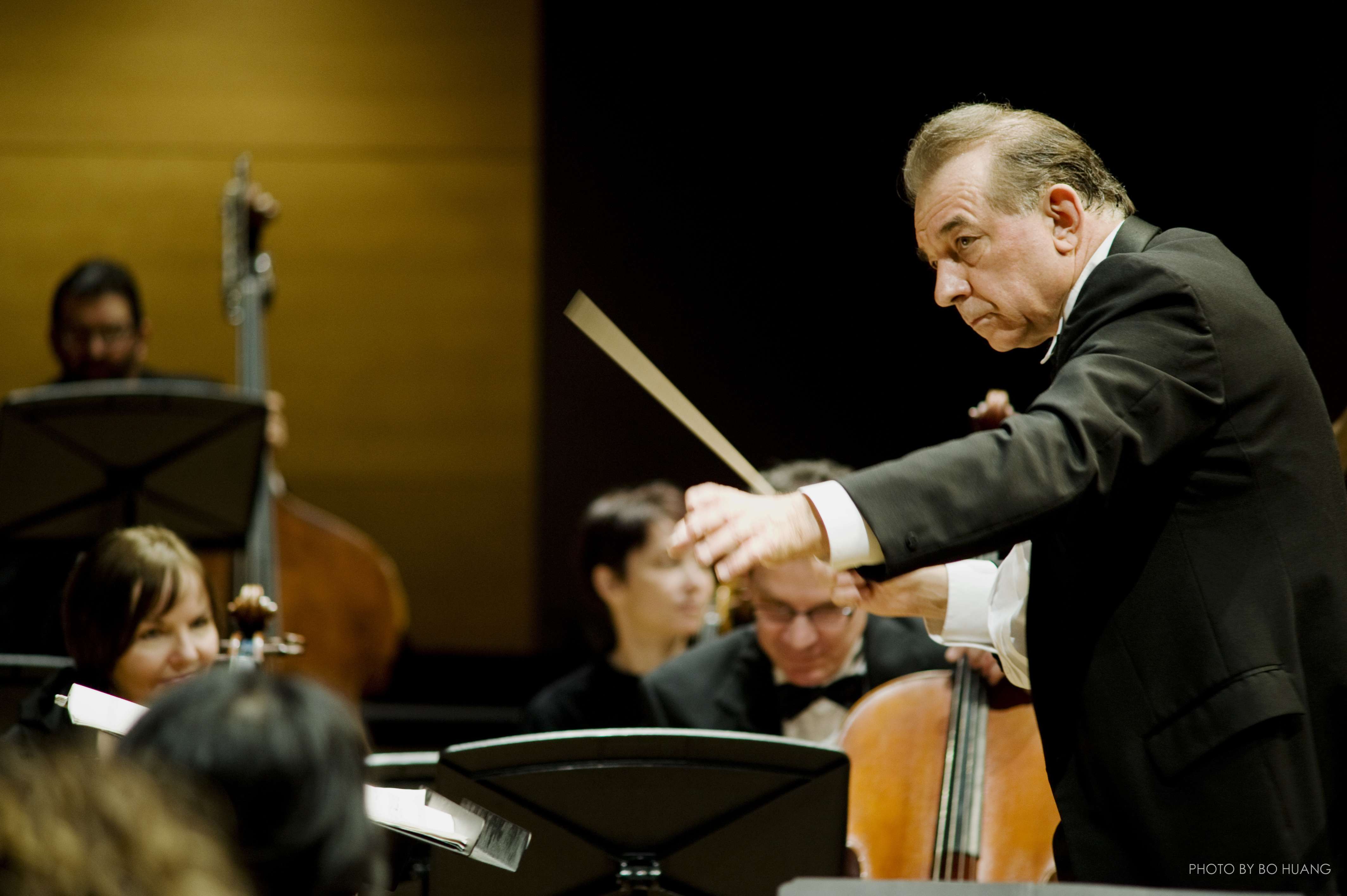|
Back
A season well-launched Toronto
Koerner Hall
10/24/2013 -
R. Murray Schafer: No Longer then (10) Ten Minutes
Claude Vivier: Zipangu
Samy Moussa: Gegenschein, Study #3 for large orchestra – Zodiakallicht, Study #4 for large orchestra
Alfred Schnittke: Viola Concerto
Teng Li (viola)
The Esprit Orchestra, Alex Pauk (conductor)

A. Pauk (© Bo Huang)
Toronto’s Esprit Orchestra opened its 31st season with a program titled New Era Launch. The organization doesn’t seem to be embarking an anything really new because that is what they have been doing all along. In many ways the “new era” began 50 years ago with the establishment of the Ontario Arts Council, to whom this performance was dedicated, which over the years has funnelled over two million dollars to the orchestra, which has also benefited from support the OAC has given to individual composers and performers.
The program opened with R. Murray Schafer’s playful No Longer than 10 (Ten) Minutes. He gave the piece the title because that is what was specified in its commission by the Toronto Symphony Orchestra in 1970. (Have you ever noticed that new works tend to be confined to the opening portion of an otherwise conventional program?) The entire piece is as mischievous as the title, if not more so. As we await the arrival of the conductor, a few string players begin a tremolo that grows into a kind of glissando; the conductor finally arrives (eliciting applause) and begins to conduct. There is much swooshy atmospheric sound from the 78-member orchestra, and at one point the players whistle. Then there is a big build-up leading to what seems the finale, with the players all standing (even the cellists - very awkward for them). The conductor departs during this and the music ends and there is applause - but aha! - while most of the orchestra departs the percussion section resumes playing, joined by some people in the audience shaking gourds. Some orchestra members return to set up for the next piece and they start to applaud but the music does not stop until the following piece begins.
Many Schafer works call for unusual locales or other singular arrangements (for example, to be performed during the night, or at dawn beside a remote lake). The unusual presentation techniques arguably trump whatever musical value the works might have.
Claude Vivier’s Zipangu for 12 string players was commissioned by Toronto’s New Music Concerts (an extremely vital organization, founded in 1971, still going strong under co-founder Robert Aitken) in 1980. The title is the name given to Japan by foreigners in the era of Marco Polo. I could hear nothing Japanese about it; it contains washes of sound that become ethereal, then it evolves into a kind of engrossing musical saga. It certainly gives evidence as to why Vivier (who died young - murdered in 1983 at the age of 34) is held in such high regard.
We next heard two brief, punchy works by Montreal-born (1984) Samy Moussa. He now lives in Europe where, among other activities, he is director of Munich’s INDEX Ensemble. The pieces Gegenschein and were commissioned by the Montreal Symphony Orchestra in 2009. The terms “gegenschein” and “zodiacal light” are used in the study of astronomy to describe evanescent atmospheric effects. This gives some clue as to what the music delivers. I wonder what other studies for large orchestra Mr Moussa has composed? These two pieces certainly whet one’s appetite for more.
The single work after the interval was Alfred Schnittke’s monumental Viola Concerto, dating from 1985. It is a work that deserves the descriptive “harrowing” - as is the unrelenting viola part. The petite, unassuming Ms Li became our stalwart leader through this musical journey, marked by the composer’s deployment of the sounds from the extreme ends of the musical spectrum, accentuated by the absence of violins, the instruments that typically form the core sound of an orchestral piece. Overall it has a hypnotic effect as the piece eerily and insistently seeps into one’s metabolism. It’s no wonder Teng Li, lead violist of the Toronto Symphony Orchestra, has become a favourite guest of the Esprit Orchestra.
Michael Johnson
|